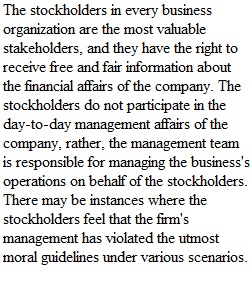


Q ASSIGNMENT 2: OFF- BALANCE SHEET ACCOUNTING AN ETHICAL STUDY IN THIS ASSIGNMENT, YOU WILL BE ASSESSED BASED ON THE FOLLOWING COURSE OUTCOME: GEL-7.02: Apply ethical reasoning to ethical issues within the field of study. Companies use off-balance sheet accounting so that they do not have to include certain assets and liabilities in their financial statements. Off-balance sheet accounting is often used to make the balance sheet look like the company has less debt than it actually does. One method used by companies to achieve off-balance sheet accounting is classifying capital leases as operating leases. New GAAP accounting rules and the Sarbanes- Oxley Act now require that capital leases must be included on the balance sheet as both an asset and liability. However, leases with a duration of less than 12 months and other long-term leases are still excluded from this reporting. Off-balance sheet accounting benefits companies as it eliminates both assets and debt from the balance sheet, improves companies’ liquidity ratios such as its current and quick ratios, and lowers leverage ratios such as debt to equity and debt to asset. You are a new accountant for a company and have discovered that the company’s management has formed a new corporation that will build a new corporate headquarters for the company and then lease the asset to the company on a 30-year lease, thus allowing the company to employ off-balance sheet accounting for the new assets. The arrangement will also allow management to make additional income from their new venture. SCENARIO: The board of directors, shareholders, and stakeholders are just now learning of this arrangement to employ off-balance sheet accounting for the new office building and of management’s profit arrangement from the new company. An alternative to this arrangement would be a sale leaseback. Read more about sale leasebacks at the following site: Singer, R., Winiarski, H., & Coleman, S. (2020). Accounting for sale and leaseback transactions. Journal of Accountancy. https://www.journalofaccountancy.com/issues/2020/jul/accounting-for-sale-and-leaseback-transactions.html CHECKLIST: ADDRESS THE FOLLOWING ITEMS: • Explain to what extent the corporation’s shareholders might feel the corporation breached any measures of an entity of the highest ethical standards. • Explain to what extent the corporation’s board of directors might ever feel that management breached any measures of an entity of the highest ethical standards. • Use at least two of the ethical viewpoints presented in ethical approaches to provide the ethical reasoning to address your company’s use of off-balance sheet accounting and management’s profiting from the arrangement. Specify the approaches you use. DIRECTIONS FOR SUBMITTING YOUR ASSIGNMENT Submit a 2- to 3-page paper with an additional title page in current APA format. Please label your assignment as “Unit 9 Assignment 2_ your name” and submit it to the UNIT 9 ASSIGNMENT 2 DROPBOX. REFERENCE Individual tax reform and alternative minimum tax: 115th Congress public law 97. (2017). https://www.congress.gov/bill/115th-congress/house-bill/1
View Related Questions